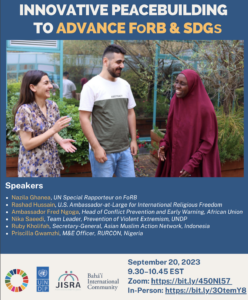
UNGA 78 High-Level Side Event on Innovative Intra- and Inter-faith Peacebuilding: Pursuing Freedom of Religion or Belief for the realization of the SDG 2030 Agenda and beyond
Links to Event:
- Zoom: https://bit.ly/450Nl57
- In-Person: https://bit.ly/3OtemY8
During the 2015 historic UN Summit, 150 UN Member States adopted the 2030 Agenda for Sustainable Development, including its 17 Sustainable Development Goals (SDGs). The success of the 2030 Agenda depends on Member States integrating three interdependent and complementary pillars: economic development, social development, and environmental protection. At the core of the 2030 Agenda sits the pledge to “leave no one behind”, including based on their religious or belief and intersecting identities. The 2030 Agenda and its SDGs aim to create inclusive, diverse, and equitable societies based on advancing and protecting the needs, aspirations, and beliefs of everyone – marginalized, indigenous, atheist, humanist, and spiritual. “All human rights are universal, indivisible and interdependent and interrelated” (Vienna Declaration and Programme of Action, 1993, article 5). These indivisible rights include freedom of religion or belief, non-discrimination, gender equality and economic, social and cultural rights. None should be asserted the exclusion of the others (ICCPR, article 5).
Obstacles to the realization of FoRB slow progress and the realization of the SDGs. For instance, SDG 10 (Reduced Inequality) calls on States to “empower and promote the social, economic and political inclusion of all irrespective of age, sex, disability, race, ethnicity, origin, religion or economic or other status”. Advancing FoRB not only strengthens open and pluralistic societies, it also addresses inequalities and discriminatory practice upheld by religious institutions. UN Member States carry the primary responsibility for implementing the 2030 Agenda. The expertise of diverse religious or belief members and communities, however, can contribute richly to putting forward innovative solutions needed to achieve the SDGs.
Objectives:
Innovative intra- and inter-religious work at the grassroots level, especially where women and youth are included, can offer important perspectives and localized solutions for realizing FoRB, and by extension, the SDGs’ goals to strengthen communities and promote sustainable development and peace.
Historically, religious actors have played a vital role in underdeveloped and conflict-affected societies and situations of transition due to their established “governance systems” along with their built-in humanitarian and conflict prevention and resolution mechanisms. Through service provision even in remote areas where governments are not present, these actors have established unique connections, based on trust and mutual respect within religiously diverse local communities, that are aligned with the core values of the UN 2030 Agenda. Their work has earned them recognition by their faith community and governments, both formally and informally, as playing authoritative and influential leadership roles to guide and shape customs and practices. However often their contributions are not fully acknowledged and remain underutilized. Therefore, it is important to mobilize the capacity and ingenuity of these actors in advancing FoRB linking them with the SDGs, to protect women’s and youth’s rights whose social, economic and political well-being are often undermined. These actors will challenge harmful norms, and practices, including misinterpretation of religious texts, that contribute to the inequalities that fuel violence (including sexual and gender based violence) and conflict.
The event will bring together policymakers, government officials, UN experts, diverse faith leaders (including women and youth) from around the world to reflect and share their experiences on the interlinkages between FoRB and the SDGs, lessons learned, and gaps and future opportunities.
Objectives:
-Showcase the significant role and impact which religious and traditional actors can leverage for the achievement of the 2030 Agenda SDGs and beyond by advancing FoRB through intra- and inter-faith peacebuilding work- including SDGs 5 (Gender), 7 (energy), 8 (economic growth), 10 (Inequality), 13 (climate action), 16 (peace, justice, and strong institutions), and 17 (multilateralism)
-Hone and generate ideas for how addressing inequalities within and between religious communities (through intra- and inter-faith peacebuilding) can be systematized across the UN and other actors’ work to realize the SDGs and beyond
-Bring together diverse high-level and grassroots actors to discuss localized solutions for religious and traditional actors to address critical issues and enhance partnership and advocacy with the UN at the local, regional, national, levels.
-Propose explicit reference to FoRB in the post-2030 agenda, in order to squarely acknowledge the objectives above and recognise the multifaceted contribution this brings to the development agenda.
Outcomes:
The expected outcome of this side-event is to create momentum for dialogue and future collaboration and partnership between local actors and policymakers at the national and global level working on FoRB. Additionally, the side-event will be a platform for stakeholders to discuss the challenges they face in advancing FoRB for the achievement of the 2030 Agenda and its 17 SDGs, and look forward to strategising on the promotion of FoRB in the post-2030 agenda.

